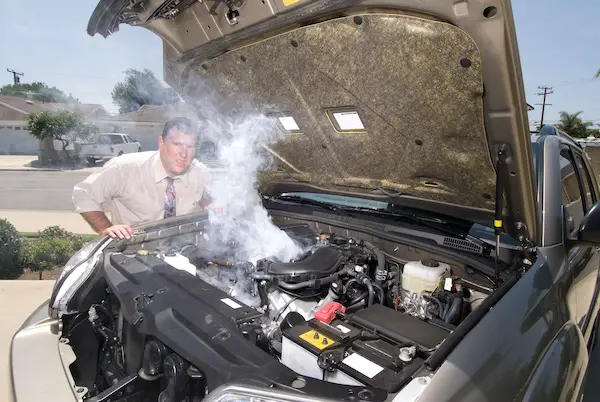Smoke has different implications for your vehicle and its engine. If you see white or grayish smoke coming from under your hood, this means that oil is burning off and going through your exhaust system. It could be due to low oil levels, or it could be due to an internal engine problem like worn valve guides or piston rings.
If you see black smoke coming from under your car’s hood, this means there’s something wrong with the fuel delivery system in some way either too much fuel is being injected into each cylinder, or not enough air is getting in there to burn off all that excess fuel before it exits through the exhaust manifold.
If you see white steam coming from under your hood, this means that coolant has overheated and boiled over into your cooling system. It might mean that fluid levels are low or that there’s a leak somewhere in the cooling system either way,
How to determine what is causing smoke from the engine?
The first thing to check is your oil dipstick. If there’s oil in the dipstick, but not on it, then you’ll want to check that all of your oil connections are secure they may have come loose in an accident or something like that.
If there’s oil on the dipstick, but no oil in the engine itself, then you will want to check for leaks around your engine. If there is no oil at all in your car, then the problem might be something else entirely like a broken belt or pulley system.
Why do cars smoke?
The most common reason is that you’ve got oil leaking from the engine, which can cause smoke to come from your tailpipe. This happens when your engine gets too hot, and the oil vapors get ignited by the heat.
Another reason for smoking is that your car has a bad catalytic converter. The catalytic converter breaks down carbon monoxide into harmless gases like carbon dioxide and water vapor.
If this part is damaged or malfunctioning, it’s not able to do its job and will release unburned fuel into the air instead of converting it into harmless gases.
This can lead to excessive emissions that make your car smell bad and may cause smoke to come out of your exhaust pipe when you’re driving along at high speeds on highways or other heavily-trafficked roads where there’s a lot of traffic around you.
If you’re experiencing problems with smoke coming out of your tailpipe—especially if it smells like burning plastic then it’s best to take your car in for service right away so that mechanics can identify what’s causing this issue and fix it as soon as possible before further damage occurs.
What are some steps you can take if your car is smoking?
Checking for leaks. If your car is smoking, it’s likely because there’s a leak somewhere in the system. Smoke means fuel, and fuel means that something has been burning for too long.
The first step is to find out where the leak is coming from so you can fix it before it becomes a problem. Checking your oil levels. When it comes to leaks, the most common culprits are low oil levels or oil that’s old and degraded beyond usefulness.
Check your oil levels and make sure they’re at least within their recommended range. Make sure you’re using high-quality oil and change it regularly. Checking for spark plugs and wires after an engine rebuild or replacement.
If you’ve rebuilt or replaced an engine in your car recently, check its spark plugs and wires for damage as well as wear and tear both can cause problems with your engine’s performance and longevity over time.
How can you reduce the risk of your car smoking in the future?
Check for cracks in your radiator or hoses these could be causing leaks which will cause your engine to overheat and smoke. You should also check your battery if it’s old, then it might not be able to hold a charge as well as it used to and may need replacing soon.
Make sure that there are no obstructions in any of your vents or exhaust pipes these can cause blockages which will make your car overheat and begin smoking as a result.
What are the symptoms of a smoking car?
The most common symptom of a smoking car is the smell of burning rubber. This can be caused by a number of different things.
The transmission fluid is burning up.
Oil has gotten onto the exhaust manifold.
A vacuum leak in the intake manifold or carburetor.
A fuel injector is leaking fuel into the combustion chamber.
Conclusion
You should know your car’s smoking under the hood like a pro now. You know what to do if your car starts smoking, and you’ve got an idea of what could be causing it. If you have any questions or concerns, feel free to ask them in the comments below.

